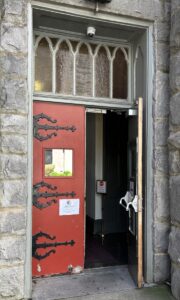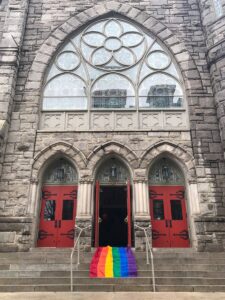More Than Bread
The Red Doors
There are two sets of bright red double doors at church I serve. The first set is large, and leads into the sanctuary, which faces Peachtree Street, Atlanta’s busiest and most popular thoroughfare. The second set is smaller, and leads into the fellowship hall, which faces Fifth Street, a minor street that intersects Peachtree Street. Both sets of doors bear witness to the hospitality this church, Saint Mark United Methodist Church, has practiced over the years, especially to persons who have been marginalized and oppressed.
The First Set of Red Doors
The larger set of red doors was opened to the LGBT community in the late 1980s and early 1990s. It happened when some of the older women, of the then declining congregation, handed out water to the passersby during the annual PRIDE Parade, telling them God loves them, and invited them Saint Mark. Members of the LLGBT community were moved by the kind gesture, and started visiting the church. Saint Mark welcomed them into the full life of the church. A once dying congregation was revitalized by the hospitality they showed to the LGBT community, and to this day they make up more than 90 percent of the congregation.
The Second Set of Red Doors
 The smaller set of red doors was opened to our unhoused and food insecure neighbors in Midtown more than 35 years ago. These doors lead to our fellowship hall, where approximately 65 men and women are served a meal every Saturday morning at our Breakfast Club ministry. It started in the mid 1980s when some members recognized the increased population of unhoused men and women, and felt compelled to do something about it. They created the Breakfast Club, where our unhoused and food insecure guests sit at a table, set with plates and utensils, and are served and waited on by volunteers. This ministry happens every Saturday morning since then, and some of our guests have been coming for years.
The smaller set of red doors was opened to our unhoused and food insecure neighbors in Midtown more than 35 years ago. These doors lead to our fellowship hall, where approximately 65 men and women are served a meal every Saturday morning at our Breakfast Club ministry. It started in the mid 1980s when some members recognized the increased population of unhoused men and women, and felt compelled to do something about it. They created the Breakfast Club, where our unhoused and food insecure guests sit at a table, set with plates and utensils, and are served and waited on by volunteers. This ministry happens every Saturday morning since then, and some of our guests have been coming for years.
Reason I Highlight These Doors
Both sets of doors have been opened in hospitality to two different groups of people to enter the church, but one group has been greater impacted, having a fuller and more robust role in the life of the church, than the other group. I wanted to understand what causes the difference, and what can be done, if anything, to create a pathway for the other group also to know they are welcomed into the full life of the church, and for the opportunity for discipleship – both for the volunteers and our guests.
Project and Research Process
My intent behind this project was to evaluate how our Breakfast Club volunteers practice hospitality to our unhoused and food insecure guests we serve, and what is done to make them know they are welcomed into the life of Saint Mark. Because I am new to the congregation, I needed to see and understand how the ministry is done. I did the following:
- I went to the Breakfast Club a few times
- I spoke with/interviewed volunteers and guests, and observed, and asked questions such as:
- How was your initial experience? First impression matters; it can determine if a volunteer or guest returns.
- How long have you been volunteering/coming? To know the length of time volunteer and guest have been together, for the opportunity to build relationship.
- What are the interactions with each other beyond serving or receiving a meal? To determine what opportunity each volunteer has to show hospitality and tell of God’s love to every guest who comes.
- Do you know the names of the guests you serve? To determine how intentional we are to get to know our guests and build relationship with them, beyond seeing them just as persons who are hungry.
- Do you eat with the guests or sit at the table with them? To know the quality time spent with the guest, not from a “we are here to help you” position, but from a “we would like to get to know you” one.
- Why do you participate/come each week? To know the purpose behind the commitment of each volunteer and their hopes for those they serve, and the reason the guest comes.
In addition, I looked at the theological basis for hospitality, as seen throughout Scripture. I draw on the life and ministry of Jesus, since hospitality was at the core of who he was and what he did. I also looked at hospitality from a historical perspective, drawing on the Benedictine and Celtic traditions, and from a modern perspective, drawing on the work of Sara Miles at Saint Gregory of Nyssa Episcopal Church in San Francisco, through their food pantry ministry.[1]
I structured the framework for my evaluation around how hospitality is practice in all aspects of the breakfast ministry, from the initial encounter to the weekly rhythm of our repeated guests being served by the same volunteers. It includes how our volunteers perceive our guests – do they see them as just hungry people, or as bearers of the image of God who need to know that they are deeply loved by God, and there is a place for them among the people of God?
Discovery and Possible Outcomes
I concluded from my evaluation that while our guests are treated in a hospitable manner, it’s important for our volunteers to understand that hospitality is more than bread, and can change the lives of both giver and recipient.
Possible outcomes I envision when the full breadth of hospitality is practiced in our Breakfast Club ministry include:
- The goodwill of hospitality that is already being shown to our guests through the meals provided will also be extended to the feeding of their spirits – as in the ministry of Jesus, and in the historical and modern traditions, there would be a sharing of the gospel of God’s love with them through a reading of a passage of Scripture, or a brief teaching on the promises of God.
- There would be prayers – praying with and for them, and inviting them to pray as they are able.
- Building relationship – knowing their names, taking the time to listen to them, and getting to know them.
- Inviting and welcoming our guests into congregational community, letting them know there is a place where they belong.
- Have a minister present weekly to offer pastoral care to our guests
What is more is that when these are done the opportunity for discipleship becomes possible, and that creates the pathway for our Breakfast Ministry guests to be welcomed into the full life of the church. In his essay, Evangelism and Hospitality, Mortimer Arias argues, “Personal hospitality and church hospitality are inseparable in the genuine evangelization of people coming to our doorstep.”[1] While I do not think hospitality is, or should ever be contingent on evangelism, I do believe with genuine hospitality there is always the potential for invitational discipleship, and that should never be overlooked or discarded, and we should be ever ready to help those who may be open to the grace of God at work in their lives
[1] Mortimer, Arias. “Evangelization by Hospitality.” In The Study of Evangelism: Exploring a Missional Practice of the Church. ed. Paul W. Chilcote and Laceye C. Warner. (Michigan: William B Eerdmans Publishing Company. 2008), 428
[1] Sara Miles. Take this Bread: A Radical Conversion. (New York: Random House Publishing, 2008)

